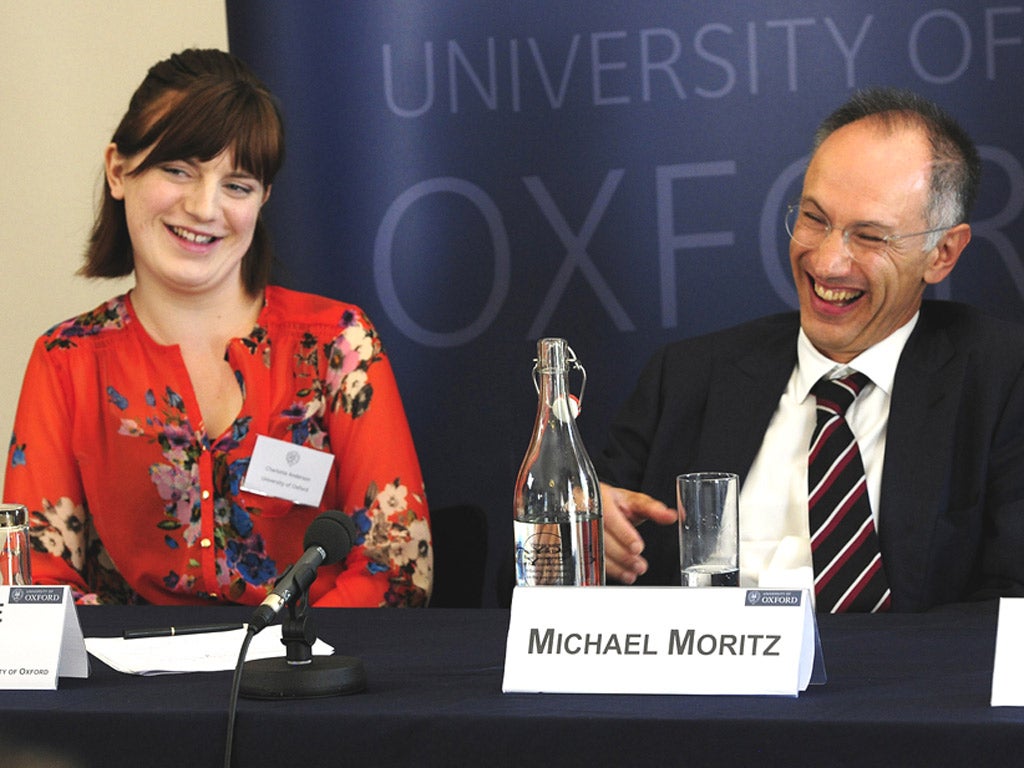Investment in the future: financier's £75m gift to help poor into Oxford
Michael Moritz and novelist wife hope to help thousands

Your support helps us to tell the story
From reproductive rights to climate change to Big Tech, The Independent is on the ground when the story is developing. Whether it's investigating the financials of Elon Musk's pro-Trump PAC or producing our latest documentary, 'The A Word', which shines a light on the American women fighting for reproductive rights, we know how important it is to parse out the facts from the messaging.
At such a critical moment in US history, we need reporters on the ground. Your donation allows us to keep sending journalists to speak to both sides of the story.
The Independent is trusted by Americans across the entire political spectrum. And unlike many other quality news outlets, we choose not to lock Americans out of our reporting and analysis with paywalls. We believe quality journalism should be available to everyone, paid for by those who can afford it.
Your support makes all the difference.Oxford University's poorest students will be spared £9,000 tuition fees thanks to the biggest philanthropic gift for undergraduate support in European history, the university announced yesterday.
A £75m gift from the venture capitalist Michael Moritz and his wife, the novelist Harriet Heyman, will mean that students with family incomes below £16,000 will have tuition fees slashed to only £3,500 per year.
This effectively abolishes the recent rise to £9,000-a-year fees. The first 100 beneficiaries will receive funding in the academic year starting this October and the university envisages that soon all students in the lowest income bracket – as many as one in ten Oxford undergraduates – will benefit.
The unprecedented size of the donation – which will help establish a student support programme totalling £300m – represents a shift for Oxford towards the American-style endowment model of university funding.
The donor, Michael Moritz, the chairman of Sequoia Capital was educated at a Cardiff comprehensive school and Christ Church College, Oxford. He previously donated $50m to his alma mater in 2008.
Mr Moritz said he was inspired to support poorer students by "the kindness of strangers" who funded him through a British education.
"The arithmetic is simple," he said. "If you are a family earning under £16,000, the cost of an Oxford education, at maybe £34,000, is terrifying. Every head throughout the UK should understand there is no obstacle for any of their pupils who have the academic ability to merit a place at Oxford."
Mr Moritz hopes the funding programme will be emulated by other universities in the UK and Europe.
Oxford's Vice-Chancellor, Professor Andrew Hamilton said that "tens of thousands, maybe even hundreds of thousands" of students would benefit in the coming decades. "The goal is to remove all barriers, real or perceived, from students' choices," he said. Universities have had their government funding cut by as much as 80 per cent since the Coalition came to power. Top universities trebled tuition fees to £9,000 per year to bridge the funding gap amid wide protest.
The Moritz-Heyman scholarship, which is worth £11,000 per year, will be additional to a government grant for low income students of £3,250, allowing scholars to complete their studies with no upfront study and living costs.
The £75m seed fund will be paid in three tranches of £25m. Each donation will be matched by the university, which will then challenge other donors to contribute a further £50m. Once this has been achieved, Mr Moritz and Ms Heyman will release the next £25m starting the process again, with the programme eventually raising £300m of funding.
It is hoped the scholarships, coupled with fee waivers and bursaries available to many of Oxford's other students with family incomes below £42,600, will counter the cooling effect of higher fees has had on admissions.
Profile: Oxford's newest benefactors
Michael Moritz learned the value of altruism at his father's knee. As a teenage refugee from Nazi Germany, Alfred Moritz had his schooling in London and later at Oxford, entirely funded by a scholarship. He went on to be a professor at Cardiff University. His son followed in his footsteps as far as Oxford, where he graduated from Christ Church in 1976 with a degree in history. After that, the younger Moritz worked as a journalist before making his millions, showing a remarkable knack for big money investments that led him to Sequoia Capital in 1986 – the company he now chairs.
An early investor in the hi-tech industries, he has sat on the board of directors of Google, PayPal and Yahoo! Now his fund is the leading backer of emerging companies in China, India, Israel and the USA.
His wife, Harriet Heyman, is a successful journalist and novelist who has worked in the newsrooms of the New York Times, the Financial Times and LIFE magazine. Her latest book, Private Acts: The Acrobat Sublime, is a study of a recently-discovered passion for the trapeze. The couple live in San Francisco.
At a press conference in London yesterday, announcing his £75m gift to Oxford University, Mr Moritz completed the circle of his father's lesson: "I would not be here if it were not for the kindness of strangers," he said. For a new generation of scholars, that kindness has been passed on – with interest.
Join our commenting forum
Join thought-provoking conversations, follow other Independent readers and see their replies
Comments